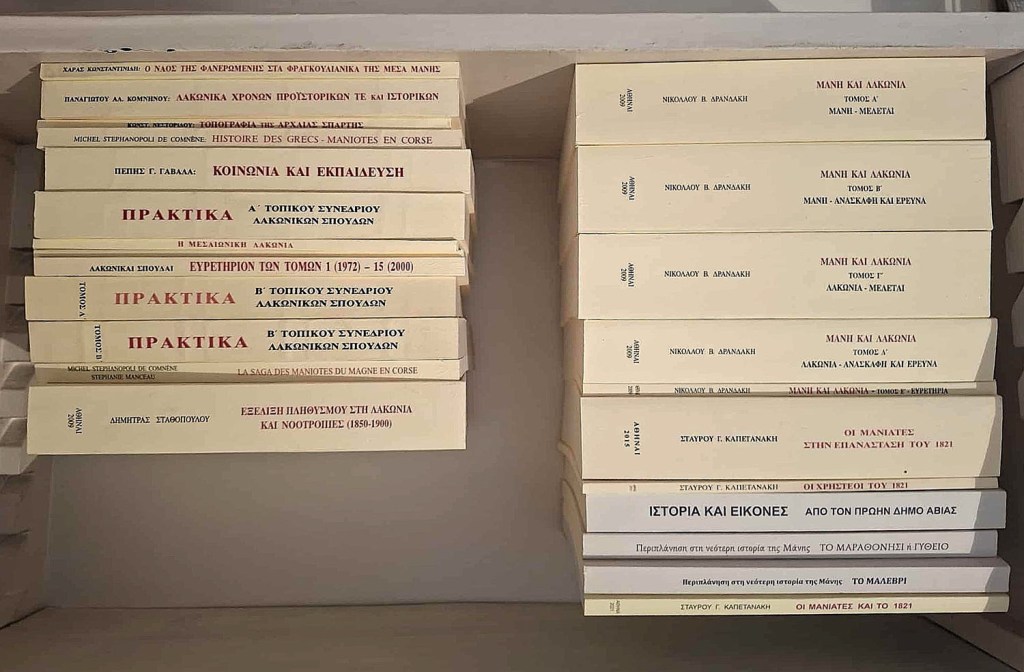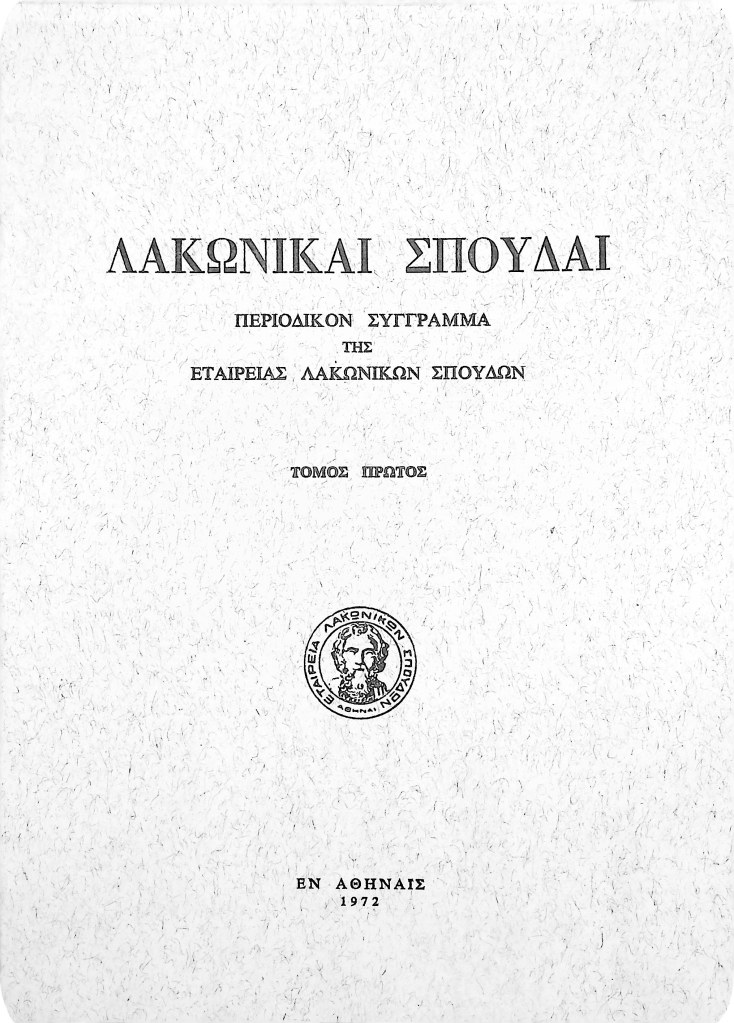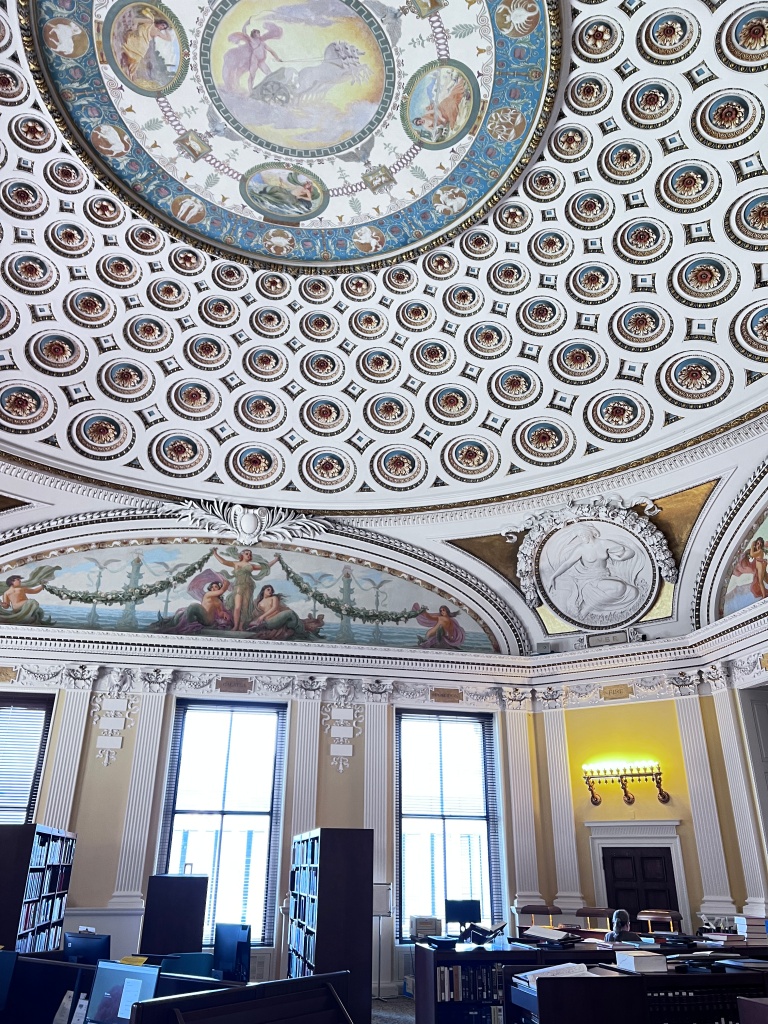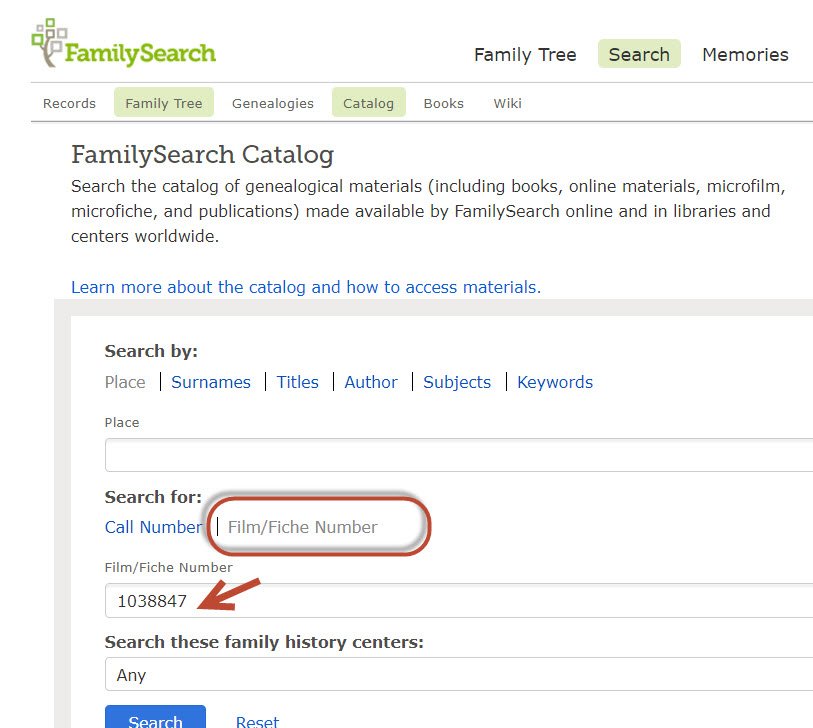The paper record trail has stopped, and you are stumped. Where to go now? You’ve obtained any and all documents available from the Archives (local and online), the Town Hall (Dimarheion), the village churches and the Greek Orthodox Mitropolis. You’ve taken a DNA test and are wading through the results, but you and your matches can’t go back far enough to find your common ancestor.
You are tempted to give up, but it’s not yet time to close the books on your research — in fact, it’s time to open them. The library awaits.

Central Library of Sparta
If you are researching in the Sparta region, there is a resource you have not yet tapped. The Central Library of Sparta has an impressive collection of village history books. These have been researched and written by schoolteachers, historians, or simply people with a deep love of their ancestral home. They have labored for years to document stories and compile family trees. Their goal is to preserve the history and pass on the legacy of their village, whether large or small, historically relevant or not. They do not want the past to be lost to time.
In July 2014, Gregory Kontos and I met such a dedicated historian. His name was Nikolaos Ath. Bagiokos, a schoolteacher in Anavryti who dedicated twenty years to researching and writing the history of Anavryti and its families. During summers when school was out, he painstakingly located any and all extant records as well as previously written histories of Anavryti. He compiled this information into his life’s work, Anavryti Taygetos. As we visited with him in his home, he expressed joy that a woman from America would travel across the ocean to learn about her roots and seek out those who could teach her. I asked him, “Why did you spend 20 years to research and write this book?” His response was simple but firmly spoken: “I wanted to write the book so people in future can know about their families.”
When I was in Sparta this past July, I learned that Mr. Bagiokos, lovingly referred to as Ο Δάσκαλος (the teacher), passed away shortly after I met him in 2014. However, he will be remembered and honored by all who read his book and learn the stories of their families which will not be found in vital records.
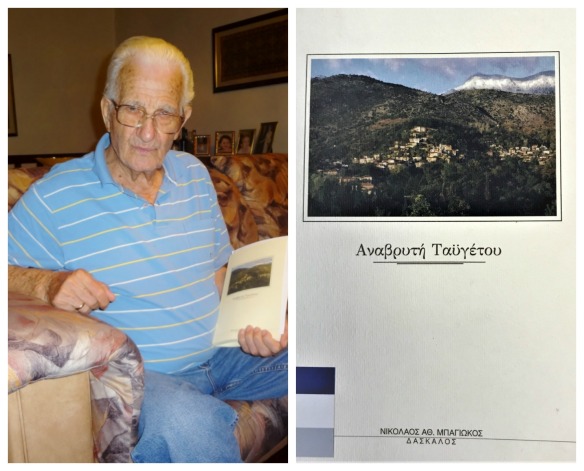
Nikolaos Ath. Bagiokos with his book, Anavryti Taygetos
These village history books are priceless. They provide a glimpse into everyday life in the village as well as customs, folklore, songs, poetry. Some contain biographical sketches of prominent families or earliest settlers. All shed new light on the world of our ancestors.
I know personally of their worth: in July 2016, my research into my Christakos family of Xirokambi skyrocketed to a new level when a friend introduced me to the book, Koumousta of Lacedaimonos. It was through this book that I learned the genesis of the family — information that the authors gleaned through oral histories and painstaking research, not to be duplicated anywhere else.
Because these books are so valuable to a researcher, I made an inventory of the ones kept at Library of Sparta during my visit there in July 2017. I took a photo of every book cover, its title page and index (if there was one). Unfortunately, only a few books included indexes, which makes it necessary to review every page to see if specific surnames are mentioned. As I perused each volume, I found that all have names of families. Thus, if there is a book from your village, it is worth the effort to obtain a copy. If the book cannot be purchased, you can view it and digitize it at the Library.
My inventory captures the books on the shelves, but it is not the entire collection. There is a catalog, somewhat outdated (2007) which lists additional books kept elsewhere in the library.

Laconia History Section, Central Library of Sparta
Below is a list of titles and authors of books kept on the shelves as shown in the photo above. Most of these books are out of print. However, you may be able to contact the author or publisher to obtain a copy.
If you would like to see the title page and publishing information on any of these books, click this link to open a Dropbox folder. The books are in alphabetical order by title; most books will have 2-3 images; e.g., there is one book on the village of Agoriani but it has three images of its cover and title pages: Agoriani (1), Agoriari (2), Agoriari (3).
I obtained a catalog of all village history books at the library–most of these are not on the shelves or in the list below. To view a pdf file of the catalog, click this link.
Remember — having names and dates will fill a pedigree chart, but having stories of your ancestors will fill your heart.
| Agoriani |
Papadogiannis, Dimitrios Ath. |
| Agoriani and Voreia |
Vergadou, Georgios Ath. |
| Amykles |
Antonakos, Sarantos |
| Amykles |
Anagnostopoulos, Georgios D. |
| Anavryti |
Pikoula, G. |
| Anavryti, Taygetos |
Bagiokos, Nikolaos Ath. |
| Ano Glykovrvrysi, The Roots of Our Village |
Papapostolos, Chysafo |
| Anogeia |
Lambrakos, Ilias G. |
| Apidea |
Kalodimas, Nikolaos E. |
| Arcadia |
Zaharopoulos, Ioan. Z. |
| Ardouvista, Androuvista of Exo Mani |
Vagiakos, Dikaios V. |
| Arna |
Prokopidis, Harilaos Ant. |
| Asimi |
Georgouli, Polychroni B. |
| Barsinikos |
Moutoulas, Pantelis |
| Chrysafa |
Lambrinakos, Giannis |
| Dafni |
Milonakos, Stavros L. |
| Dimitsanas |
Giannaropoulos, Ioannas K. |
| Elafonisi |
Mentis, Konstandinos S. |
| Falanthou, Villages of |
Gritsopoulos, Tasos Ath. |
| Georgitsi and Georgitsiani, A Village, A History |
Koutsis, Giannis A. |
| Georgitsi, the Beautiful |
Koutsis, Giannis A. |
| Geraki |
Moutsopoulos, N.K. and Dimitrokallis, G. |
| Geraki, Album |
none |
| Geraki, Byzantine |
LaFontaine, Jacqueline |
| Geraki, Excursion |
Palaiologos, Pavlos et al |
| Geraki, History |
Gritsopoulos, Tasos Ath. |
| Geraki, History and Memories |
Poulitsa, Panagiotis I. |
| Geraki, The Oils of |
Poulitsa, Panagiotis Il. |
| Geraki, Woven in |
none |
| Gkiotsali and Agios Dimitrios |
Batsakis, Kon. S. and Pragalos, Dim. A. |
| Goranus |
Plagianni, Kosta Styl. |
| Haraka |
Skagkos, Nektarios I. |
| Kalamata |
Anaplioti, Gianni |
| Karyes |
Machairas, Panos Styl. |
| Karyes – Arachova |
Pitsiou, Kosta M. |
| A Man from Kastania Remembers |
Kontos, Ioannis G. |
| Kavo Malia |
Arvanitis, Takis |
| Kerasias, Arcadia |
Stafanos, Anast. G. |
| Kokkinorrachi |
Athanasoulis, Dimitrios C. |
| Krokees |
Rozakos, Nikos I. |
| Krokees, Carnival |
Women’s Syllogos of Krokees |
| Krokees, Levetsova |
Liakakos, Petros |
| Kynouria |
Geronta, Rania |
| Kythira |
Kalligeros, Emmanouel P. |
| Leukoma of Molaois |
Moschovakos, Ioannis Sot. |
| Logkanikos by Georgakaki |
Georgakaki, Stavros Pan. |
| Logkanikos by Souchleris |
Souchleris, Leonidas |
| Lukia |
Avloulos, Stavros |
| Megali Vrysi of the Past |
Grigori, Chari Ath. |
| Melitinis |
Mihalou, Georgios |
| Metamorfosi |
Koutsogiannopoulos, G. D. |
| Molaoi |
Moschovakos, Ioannis Sot. |
| Palaiopanagia, Anogeia & Xirokambi |
Katsafanas, Dimitris G. |
| Paliomonastiro |
Stathaki, Stathi D. |
| Patrida |
Kountouri, Petros G. |
| Pellana, Ancient |
Smyrios, Athanasios G. |
| Pellana, In the Footsteps of Menelaous and Helen |
| Petrina |
Poulimenakos, Aris |
| Plytra & Karavvostasi |
Vlahaki-Proia, Matina |
| Sellasias, Administrative, Population |
Kapetanakis-Stathopoulos, Dimitra |
| Sellasias, Emigrants to Ellis Island |
Kapetanakis-Stathopoulos, Dimitra |
| Stemnitsa |
Theofili, Georgios Ant. |
| Tainaro |
Koutsilieri, Anargyros |
| Trapezontis, Kabourakiou History and Folklore |
Vasilakos, Vasileios et al |
| Tripolitsas |
Gritsopoulos, Tasos Ath. |
| Tsakona |
Tsakona, Stratis G. |
| Tsintzina (2 versions) |
Moutoulas, Pantelis |
| Tsouni |
Grigoris, Charis Ath. |
| Vardonia & the Turko-Vardouniotes |
Kapsali, Gerasimos |
| Varvitsa and Skoura |
Poumelioti, Poth. Georg. |
| Varvitsa and surrounding villages |
Mathaios, Nikos L. |
| Varvitsa by Bortsos |
Bortsos, Dimitrios Petros |
| Vassara |
Theofilis, Giagkos |
| Vatika |
Arvanitis, Takis |
| Vatika, My Homeland |
Kasouli-Simeonoglou, Aspasia |
| Vatika, The Fossil Forest |
Alevizou, Stavroula |
| Veroia |
Koufos, Nikolaos I. |
| Voia |
Arvanitis, Takis Chr. |
| Voutiani |
Trikilis, Takis |
| Voutiani, Sparta |
Tzannetos, Ioannis Konstantinos |
| Vresthena |
Spiliakou, Spiliou P. |
| Vrontamas |
Drepania, Manolis |
| Vrontamas, The Holocaust of |
Drepania, Manolis |
| When I Was a Child, 1939-1945 |
Diamantakos, Nikos |
| Xirokambi |
Laskaris, Dimitrios G. |
| Zaraka, Folklore |
Poumeliotis, Panagiotis Georg. |
| Zarax |
Petroleka, Konst. |
| Zarnatas, Messinia |
Tsilivi, Nikos Ath. |



